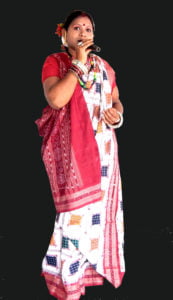Folk Artistes Hardly Get Attention, Patronage They Deserve: Padmini Dora

She is often referred to as the “Teejan Bai of Odisha”. Late legendary musician Pandit Raghunath Panigrahi called her the “Cuckoo of Western Odisha”. The Government of India conferred on her the coveted Ustad Bismillah Khan Yuva Prativa Puraskar, the nation’s highest honour for young artistes.
She is Padmini Dora, a household name and the heart-throb of millions of connoisseurs of Sambalpuri music.
Excerpts from an interview with the Sambalpur-based artiste:
Your father used to say that you were more a son than a daughter.
He said this because I was determined to be a singer and fought a lot for it. Both of my parents were into music. My father was a khol (percussion) player and mother was a sankeertan (devotional music) singer. We were four sisters and two brothers. All of us had interest in dance or music. But hailing from a poor farmer’s family and living in a village amidst conservative social system, it was difficult to dream of becoming artistes.
Though we were encouraged to sing devotional music at home, my father opposed my decision to be a folk singer. A girl performing on stage was looked down upon in our society then. But I was determined. I purchased an old harmonium by saving my pocket money for years. By the time I finished my schooling, I applied in All India Radio, Sambalpur for an audition.
I also wanted to be educated. I used to travel 30 kilometres daily from our village to do my graduation at Sambalpur town. I married Mohit (Mohit Kumar Swain, folk arts exponent) against the wishes of my family because he is an artiste and was willing to support my dream of becoming one. My father finally realised my struggle when I could prove myself and made this statement out of appreciation.
Did radio give you the big break in your career?
After my parents, radio was my second guru, literally. I got a lot of inspiration and knowledge about music as a passionate listener of radio. AIR, Sambalpur gave me a big break when I was very young. I was even granted a B-High grade from AIR when I was just 20.
But the stage seems to be your forte?
The stage has fetched me fame, fortune and popularity. I have evolved my own style of singing by incorporating elements of dance in it. So, the audience enjoys my shows more as a dancing-singer. They not only listen to the enchanting rhythm inherent in Sambalpuri music but also witness it simultaneously in my body language.
You are known to be a purist. Is there a market for your kind of music? Can one pursue it as a profession?
To me, my culture matters more than a market for my music. Our traditional Sambalpuri folk music is pure. Mindless commercialisation brought in elements of vulgarity into it. This was why my father was against my stage shows as a folk singer. I am proud of my culture and tradition and I strive to present it in its purity. The song, its lyrics, the accompanying musical instruments and even the costume of the singers must adhere to tradition in all my shows.
Of course, my decision to remain rooted to my tradition makes me a loser financially. But I did not take up music to earn money. I became a folk singer because I loved it. I take pride in being a purist. I get a lot of love and respect from my audience and critical appreciation from music exponents. The Ustad Bismillah Khan Award is the best endorsement of my loyalty to our age-old folk tradition.
You have been performing across the country. Where did you find an exciting audience response?
I have got the best response from the Kolkata audience. A large number of Odias living there attend my shows. Bengalis also love and appreciate Sambalpuri music and that gives me so much joy. This inspired me to sing some Bengali songs in Sambalpuri style. After Kolkata, I find the audience in Delhi and Bengaluru attending my shows with enthusiasm. However, my show at Leh in Ladakh and in Kashmir were the most memorable ones. There were none in the audience from my state who understood my language or culture, yet the people enjoyed our music and its rhythm. They danced to our music.
Are you interested in singing for films?
I have been a playback singer in three films made in Sambalpuri language. Two of these are yet to be released. But because I am choosy about the lyrics, I may not fit into the demands of commercial cinema.
How has been the Government’s patronage towards folk artistes?
We face a lot of discrimination, both in terms of respect and remuneration, compared to classical artistes. Folk arts enjoy mass appeal. Yet, folk artistes hardly receive the attention and patronage they deserve.


Comments are closed.